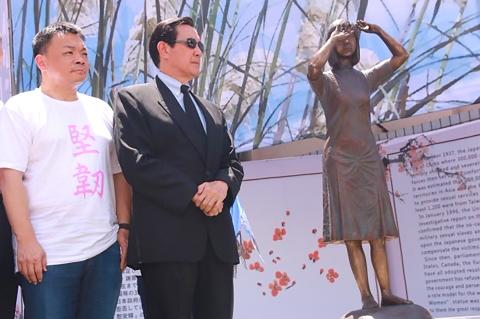The Ministry of Foreign Affairs yesterday reiterated its unwavering stance on the issue of “comfort women,” after Japan expressed “extreme disappointment” over the installation of Taiwan’s first bronze statue honoring comfort women in Tainan.
“The government has always paid close attention to the issue of comfort women. Our stance on the matter, as well as our policy to fight for their dignity, remains unchanged,” ministry spokesman Andrew Lee (李憲章) said in a news release, adding that negotiations with Japan on the matter would continue.
The government did not play a part in the erection of the statue by a civic group in Tainan on Tuesday to mark International Comfort Women Day, Lee added.

Photo courtesy of Chinese Nationalist Party (KMT) Tainan mayoral candidate Kao Su-po
The ministry’s remarks came just hours after Japan Broadcasting Corp (NHK) reported that Japanese Chief Cabinet Secretary Yoshihide Suga lamented the statue’s installation during a news conference after a Cabinet meeting in Japan.
“The establishment and exhibition of comfort women statues in various parts of the world is extremely disappointing, as it is not compatible with the position and efforts of the Japanese government so far,” Suga was quoted by the NHK as saying.
The statue in Tainan, which stands on an open space next to the Chinese Nationalist Party’s (KMT) Tainan chapter office, was erected by the non-profit Tainan Association for Comfort Women’s Rights, with assistance from the KMT.
Some Japanese media have speculated that the move was motivated by Taiwan’s nine-in-one elections in November, and was part of the KMT’s efforts to criticize the generally friendly stance of the Democratic Progressive Party administration toward Japan.
The Taipei Women’s Rescue Foundation estimates that about 2,000 Taiwanese women were forced into sexual slavery by the Imperial Japanese Army during World War II.
The Asian Women’s Fund — a quasi-public organization established by the Japanese government in 1995 to address the issue through “atonement” projects, before dissolving it in 2007 — had tried to offer Taiwanese victims compensation of ¥2 million (US$18,014 at the current exchange rate) per person and a letter of apology.
However, some Taiwanese victims refused to accept the money as they felt it did not show that the Japanese government was taking responsibility for their actions.
The Japan-Taiwan Exchange Association in Taipei yesterday declined to comment on the matter, saying only that the Japanese government had tried to address the issue through various measures taken by the Asian Women’s Fund.

Taiwan is projected to lose a working-age population of about 6.67 million people in two waves of retirement in the coming years, as the nation confronts accelerating demographic decline and a shortage of younger workers to take their place, the Ministry of the Interior said. Taiwan experienced its largest baby boom between 1958 and 1966, when the population grew by 3.78 million, followed by a second surge of 2.89 million between 1976 and 1982, ministry data showed. In 2023, the first of those baby boom generations — those born in the late 1950s and early 1960s — began to enter retirement, triggering

One of two tropical depressions that formed off Taiwan yesterday morning could turn into a moderate typhoon by the weekend, the Central Weather Administration (CWA) said yesterday. Tropical Depression No. 21 formed at 8am about 1,850km off the southeast coast, CWA forecaster Lee Meng-hsuan (李孟軒) said. The weather system is expected to move northwest as it builds momentum, possibly intensifying this weekend into a typhoon, which would be called Mitag, Lee said. The radius of the storm is expected to reach almost 200km, she said. It is forecast to approach the southeast of Taiwan on Monday next week and pass through the Bashi Channel

NO CHANGE: The TRA makes clear that the US does not consider the status of Taiwan to have been determined by WWII-era documents, a former AIT deputy director said The American Institute in Taiwan’s (AIT) comments that World War-II era documents do not determine Taiwan’s political status accurately conveyed the US’ stance, the US Department of State said. An AIT spokesperson on Saturday said that a Chinese official mischaracterized World War II-era documents as stating that Taiwan was ceded to the China. The remarks from the US’ de facto embassy in Taiwan drew criticism from the Ma Ying-jeou Foundation, whose director said the comments put Taiwan in danger. The Chinese-language United Daily News yesterday reported that a US State Department spokesperson confirmed the AIT’s position. They added that the US would continue to

The number of Chinese spouses applying for dependent residency as well as long-term residency in Taiwan has decreased, the Mainland Affairs Council said yesterday, adding that the reduction of Chinese spouses staying or living in Taiwan is only one facet reflecting the general decrease in the number of people willing to get married in Taiwan. The number of Chinese spouses applying for dependent residency last year was 7,123, down by 2,931, or 29.15 percent, from the previous year. The same census showed that the number of Chinese spouses applying for long-term residency and receiving approval last year stood at 2,973, down 1,520,